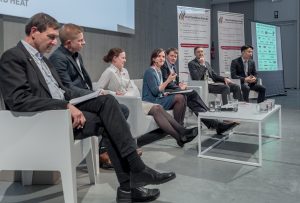This HRE4 workshop, organized on 11 May 2017 during the DecarbHeat Forum in Brussels, looked at best practices, tools and solutions, which could help local authorities accelerate the switch to more efficient buildings and low carbon heating and cooling.
Dominique Ristori, Director General at DG Energy, introduced the topic of the workshop by highlighting the importance of the decarbonisation of heating and cooling sector to meet the Energy Union objectives of a secure, sustainable and competitive energy for all consumers.
The moderator Claire Roumet, Director of Energy Cities, opened the session giving the floor to the keynote speaker: Professor Brian Vad Mathiesen, coordinator of the HRE4 project.

Prof. Vad Mathiesen presented the latest updates from the HRE project and highlighted the importance of a proper planning for Europe to develop an efficient heat infrastructure. Furthermore, he stressed that one of the goals of the HRE4 project will be to help those countries that are lagging behind in the energy challenge by giving them data and information on how to accelerate the switch from fossil fuels to renewable energy.
Following the keynote speech, a series of presentations looked at the circular economy for materials and energy (Mr Hans-Martin Friis Møller from Kalfor), citizens’ engagement (Ms Helen Andrews Tipper from Carbon Trust), technical and financial assistance aspects of the building renovation challenge (Paul Kenny, from the Tipperary Energy Agency) and Beijing energy strategy (Cooper Zhao from CECA).
After the presentations, Carsten Rothballer from ICLEI Europe (partner of HRE4) joined the speakers for a panel discussion. Some of the key points raised during the discussion were:
– Energy savings are too important and they need to be coupled with RES if Europe wants to achieve full decarbonisation.
– In the heating and cooling sector, there is no “one solution fits all”.
– Subsidies to fossil fuels distort the energy market.
– Local authorities need to step-up and be the drivers of the renovation challenge.
– Consumers’ trust is a key element for speeding up the building renovation challenge.
– Cities should make full use of locally available energy sources.
The session was then closed by a final remark by Claire Roumet on the important role played by cities in the decarbonization of the EU building stock.